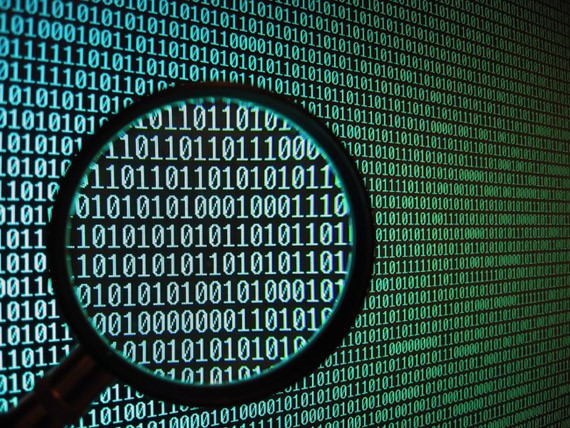
To listen to this reflection as a podcast, click here.
Throughout the month of August, we’re looking at Ecclesiastes, that strange and seemingly “modern” Old Testament book that depicts what happens when humanity searches for ultimate meaning apart from God.
Fear can lead us to do crazy things.
In 2003, fear almost led the President of the United States to order fighters to shoot down commercial airliners.
In his book Pay Any Price, Pulitzer Prize-winning journalist James Risen recounts the harrowing tale of Dennis Montgomery. Shortly after the 9/11 terror attacks, Montgomery approached the U.S. government claiming to be a computer programming savant.
He announced that he had developed a magic weapon to stop terrorism.
Montgomery claimed that his super-secret computer technology could decipher coded messages from Al Qaeda that were hidden in plain sight in the corporate logo of Al Jazeera, the television network that occasionally aired taped statements from Osama Bin Laden.
At this point, a thoughtful person should pause and say aloud, “That’s the dumbest thing I’ve ever heard.”
But America’s intelligence community – deeply embarrassed by its failures to foresee 9/11 and to find weapons of mass destruction in Iraq – grabbed hold of Montgomery’s program as if it were the Holy Grail. In Risen’s words, “It was too impossible to disbelieve.”
Dennis Montgomery convinced key people that Al Qaeda was communicating through bar codes hidden on TV broadcasts. And only he could make sense of it all.
In December 2003, Montgomery’s computer program began to spit out hidden letters and numbers: AF, UA, AA, followed by two- or three-digit numbers. The CIA quickly decided these must represent Air France, United Airlines, and American Airlines flight numbers. Then Montgomery ominously passed along the repeating symbol C4. Explosives!
Listening to his advisors, President George W. Bush grounded a number of transatlantic flights, stranding thousands of passengers on foreign shores.
Certain CIA officials were so sure that Montgomery’s program was America’s most vital source of intelligence data, and so fearful that another attack was imminent, that the White House even contemplated shooting down jetliners that were already airborne.
Fortunately, Dennis Montgomery’s house of cards came tumbling down before that could happen. It turns out the self-proclaimed genius had no computer programming skills at all. His services, for which he was paid millions of dollars, constitute “one of the most elaborate and dangerous hoaxes in American history.”
Fear can lead us to do crazy things. And to believe things that under any other circumstances we would never even consider.
How do you impress people who live in our day and age? Hit them with data. Inundate them with knowledge – real or imagined.
But the crying need of our day and age isn’t another graph, white paper, or secret keys to unlocking secret codes. It’s wisdom. “Westerners live in a culture that has separated knowledge from ethics,” writes author Terry Muck. Standardized methods for identifying “smart people” – whether IQ tests, SATs, or beating the rest of your family every night watching Jeopardy! – are not to be confused with measurements of spiritual and emotional health.
Insightful and informed people, in other words, are not necessarily people who grasp the meaning of life. It’s quite possible to know a great deal about a lot of stuff, yet not know how to live.
Our society is starved for wisdom – which just happens to be right up the alley of the author of Ecclesiastes:
“Wisdom, like an inheritance, is a good thing and benefits those who see the sun. Wisdom is a shelter… Wisdom preserves those who have it… Wisdom makes one wise person more powerful than ten rulers in a city” (Ecclesiastes 7:11, 12, 19).
Wisdom isn’t about becoming a more intelligent person, or fooling people at the CIA. It’s a call to become a “spiritual street-smart” person – someone who knows how to thrive in a culture where listening for God’s voice has become something of a lost art.
It’s worth noting that 15% of the total volume of the Bible is so-called Wisdom Literature – the books of Job, Psalms, Proverbs, Song of Songs, and of course Ecclesiastes.
How in the world do we make sense of such much content?
At least we know where to begin: “The fear of the Lord is the beginning of wisdom” (Proverbs 1:7, 9:10; Psalm 111:10).
It’s amazing that Scripture never once tells us to fear the devil. We are not to fear evil. There is no need to fear death. Jesus even tells us not to be afraid of people who are seriously intent on harming us (Matthew 10:26-31).
Instead, spiritual health is all about cultivating an appropriate fear of God. That’s not to be confused with spiritual paralysis or a sense of servile terror. “Fearing God” means choosing to take God seriously – embracing with joy his promises of mercy and grace, even while heeding his warnings when we’re tempted to succumb to disastrous choices.
To paraphrase Augustine, the church’s first great theologian, life really comes down to just two choices: We can either fear God or fear everything else.
That’s a great thing to remember the next time you turn on the national news.
Not to mention a reminder that it’s OK to stop looking for hidden bar codes in every morning reflection.
